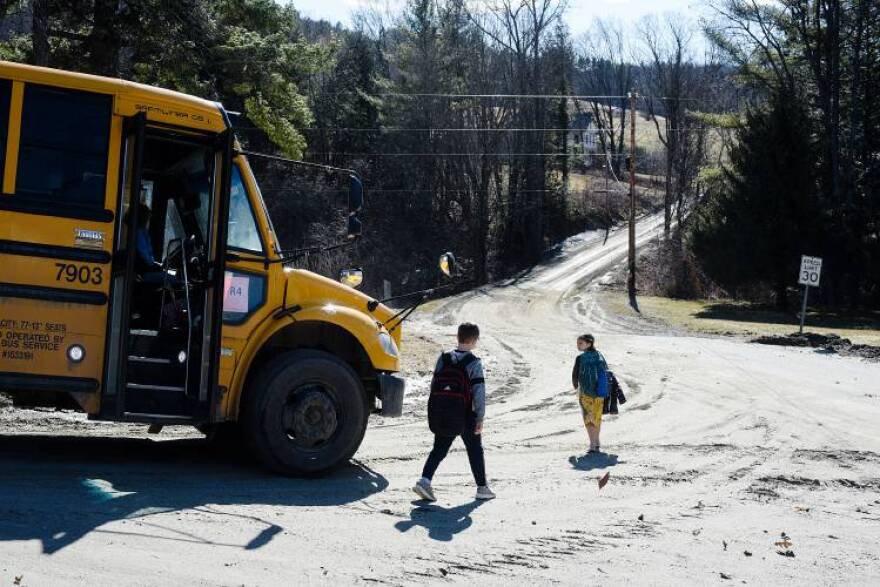An ATV carved its way up a muddy road off of Route 113 to carry a patient to an ambulance; schools suspended bus service on gravel roads; the mud on some back roads swallowed up the stone that road crews poured.
“It’s of Biblical proportion,” said Tim Murphy, the chairman of the Royalton Selectboard, of this year’s mud season.
He lived five miles from a paved road for 26 years, and his former neighbors say that the mud has never been so extreme. He has been grappling with some survivor’s guilt now that he lives on the South Royalton green, comfortably removed from the mud’s clutches.
The Royalton road crew pulled a 22-hour shift, from midnight Friday to 10:00 p.m. Saturday, as they tried to gain ground against the mud, he said. And their work is not done. In most mud seasons, the town can target one or two stretches of road. This year, the mud is everywhere.
The White River Valley School was forced to keep its buses off of all gravel roads in Bethel and Royalton through the end of the week, instead picking children up from the closest intersection with a paved road, according to emails to parents from school officials.
Mud season came quickly and violently this year, stranding people in their homes. And it is not just an anomaly — New Englanders may be in for a longer mud season as the climate warms, said Alix Contosta, a research assistant professor of environmental science at the University of New Hampshire.
Mud season takes hold in early spring because frozen ground melts from the surface down. Ice in the soil turns to water, but it cannot move past the still-frozen ground below it. A thick layer of mud pools, and it lingers until the water can percolate down into the groundwater or flow into rivers.
It may seem counter-intuitive, but frost penetrates more deeply in a warmer winter. When more precipitation falls as rain than as snow, snow melts faster and snow cover is scant, Contosta explained. While a thick blanket of snow insulates soil from cold air, exposed soil is vulnerable to the icy temperatures that still punctuate even a warm winter in New England.
This year, snowfall was well below average across the state, and the frost gained a deep hold in the soil, she said.
“This tends to result in a worse mud season in the spring because the deep frost is going to take a long time to thaw out,” she said.
But that is not the only environmental factor that she hypothesizes to be at play. She studies the lengthening “vernal period,” which begins with the melting snow and closes when green overtakes the landscape.
Historically, leaves began to peek out of branches as snow melted, she said. But there is a lag that appears to be lengthening, and Contosta expects climate change to be the culprit. Snow melts earlier as temperatures rise. Green-up is also inching earlier in the year, but it is beholden to factors that do not change with the climate, such as sunlight. The lag between snow melt and green-up may grow. Plants draw water out of soil as they bud, alleviating muddy conditions, so a greater lag may lead to a worse mud season.
While Contosta focuses on the science, some of her colleagues at UNH look more closely at the practical implications of a severe mud season.
For example, New England roads have a “winter weight premium.” A frozen road can bear up a heavy vehicle, she said. Meanwhile, there are spring load restrictions that keep trucks off of back roads, she said. And a lengthy period with weight restrictions on roads has economic consequences.
“Clearing snow is a nuisance, and sustained snow can feel uncomfortable,” she said. “But that snow cover and persistent cold is important to the functioning of our society.”
Steve Ward, who owns Ward’s Garage in Vershire, said that about 20 people have called since Saturday because they were stranded in the mire.
“We’ve never had roads this bad, never,” said Ward, who is also the Vershire fire chief. He first joined the department in 1980.
His department had to unload an ATV to respond to the emergency call on Saturday morning, which it hasn’t had to do in “a while.”
In Royalton, high diesel costs and extra labor costs might take a toll on the municipal budget, although Murphy said he cannot capture what it will look like for about a month.
More than anything, though, he worries about emergency services on back roads.
Volunteers between Barnard and Bethel have their ATVs loaded in case they are called on to rescue someone on a back road, he said.
Brenda Field, Tunbridge’s fire warden and emergency director, echoed his concern.
“This certainly wasn’t on my list of emergencies, but it will be now,” she said. “FEMA will be scratching their head on this one.” She has scrambled to set up mutual aid agreements with other departments to make sure that there are all-terrain vehicles equipped with stretchers on call.
The mud is so thick that road crews have had to shovel it off the roads or else it would keep consuming the stone they applied, she said. Field and Fire Chief Simon Bradford put in place a burn ban because fire trucks would struggle to make their way through the mud. The South Royalton Fire Department also put in place a burn ban, which it announced on Facebook.
But Field hopes that the end may be in sight — if only Monday’s wind keeps up to dry out the roads, sunny days draw out the frost and road crews have a chance to catch up.







